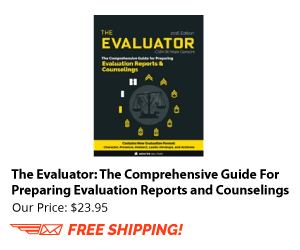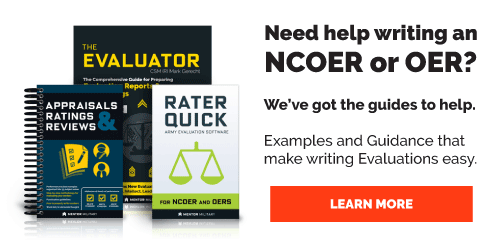So you just finished writing an evaluation report and you sit back and gaze upon the masterpiece you created. It took you all of 15 minutes to finish–you begin to wonder why people have such a hard time writing evaluation reports. You take one final look at the report and realize you forgot to mention something extremely significant. How could you have missed that?
Truth of the matter is that it is very easy to overlook events while writing evaluation reports, especially if you have not properly prepared beforehand. Most leaders believe they are writing fair and accurate reports. However, some leaders fail to recognize how many factors come into play when writing an evaluation. For example:
- What was your mood at the time you wrote the report?
- What was the last significant event that occurred with the individual you are preparing the evaluation report on?
- How is this individual viewed by your superiors?
- What was their prior evaluation report like?
Many people believe they are professional enough to discard such thoughts, and to a large degree, this is true. However, these factors are always present and have more of an impact on an unprepared rater or senior rater than they do on one who has prepared properly. You are a leader. You are paid the big bucks to work a little harder to ensure your subordinates get a fair and accurate report. How do you make sure the report is fair and accurate?
Step 1: Set the foundation

Writing a fair evaluation always begins with laying out your foundation.
Begin with a good initial counseling. It should contain your expectations, standards, upcoming events, the role of the rated Soldier in the upcoming events, and an initial duty description. You should also provide your support form and the senior rater’s support form. Write your initial counseling and set it aside. Ask someone you trust to read it. Come back to this document once you have considered their comments. Review the document again and incorporate any changes. This document should become the foundation to all of your initial counseling documents. Ensure that all your forms are filled out correctly. Consider reviewing books on the evaluation process (like The Evaluator—oops, yeah I wrote that one—could not resist the marketing plug). Remember: you can speak with the S-1 to get duty descriptions.
What does an excellence look like?: To find information on this read FM 6.22, read old NCOERs for examples, and read the evaluation regulation.
Understand the process: If you lay the foundation correctly it will serve you well in the future. The best approach is developing a thorough understanding of the regulations, processes, and procedures. Now you only need a refresher when policy changes. Trust me, the basics stick. Learn them.
Step 2: Give the warning order
Before the initial counseling session, inform the rated Soldier you would like to see them. Hand them a copy of the draft initial counseling, explain that your initial counseling will be a joint effort. You want them to read the document and provide their input. You should give them specific question to answer or think about. Consider topics such as:
- review your duty description and let me know if you would like to suggest any changes
- I am interested in your assessment of the squad/section/platoon.
- name three of your strengths?
- name three of your weaknesses?
- what changes would you make to the way the unit conducts training?
- what would you change with regard to unit operations?
This will also provide you insight into the Soldier. If the Soldier comes to the meeting well prepared to answer your questions, you can be assured he took your comments seriously and is proactive. If he shows up and displays little interest, it may be an indicator of problems to come. What he does not do or fails to do in preparation for this session will speak volumes about him and his performance. Smart Soldiers will see this as a fantastic opportunity to prove their value and have their voice heard.
Step 3: Execute the session
When the Soldier shows up for the session, begin by putting the Soldier at ease and getting him to relax. Talk about something he is interested in (family, sports, etc.). Try to communicate your genuine interest in the Soldier. Ask more open-ended questions. Consider these:
- I have reviewed your records and see that you have been in grade for 3 years. What are your goals?
- Are you attending college?
- Are you involved in the community?
- How do you feel about your last evaluation?
From here, go into the question you gave the Soldier in Step 2. Pay careful attention to how the Soldier answers the questions. Look for his nonverbal communication. Is he looking at you? Is he speaking with confidence? Many times what the Soldier does not say is far more important than what he says.
During this process, give the Soldier specific examples of what you believe rates an excellence. If you are a senior rater and do not have an above center of mass or a one block, tell them! This is important because you want the Soldier to do a good job regardless of the top block situation. Remember the write up can say “Walks on water and p!$$es fish” even if the center of mass block is checked. Also keep in mind that your inability to manage your profile tells your subordinates something not so positive about you!
Step 4: Make the Soldier part of the process
It is important to make the Soldier part of the process. Tell them you expect them to maintain an achievement file that lists all their achievements during the rating period and that they will be required to show it to you during each counseling session.
Step 5: Don’t trust your memory

Don't count on your memory. Make notes when you verbally counsel a Soldier so your facts don't get tangled.
You’re not Commander Data from Star Trek. You won’t remember everything. When the Soldier does something good, write it down. When he does something bad, write it down. If you verbally counsel them, write it down. If someone tells you something good about them write it down. You probably get the picture by now, but you may be asking why you should be taking all of these notes. Before you begin to write an evaluation, consult your handy little journal. Read the latest entries about the Soldier in question and make sure your mood and last interaction with them prior to preparing the final evaluation report does not bias your evaluation.
Step 6: Follow-up counseling sessions
Perform regular counseling throughout the rated period. Ensure you cover areas the Soldier should sustain, areas that require improvement, any changes to duty descriptions or appointed duties, and your priorities. I have had several leaders who did not believe counseling was necessary. They felt they were very effective leaders who counseled subordinates daily so the need to counsel and follow a regulation was “absolutely ridiculous.” Not exactly the best leaders I ever worked for… notice I said for and not with. During this session ask the Soldier to show you their achievement file. If the Soldier has not prepared an achievement file, verify that they understand the requirement to keep a file. Explain the importance of such a file. This is their opportunity to contribute to their own evaluation!
Step 7: Holy c@#p! It’s time to write what?

If you keep up date and organized with steps 1-6. You'll have no reason to panic when the day comes to actually write the counseling.
That’s right. Before you know it, the evaluation day is upon you. Take your time. Relax. You are prepared. Lay your notes out. If you have done your homework correctly in steps 1-6 the report has essentially already been completed. It has been written over time in your counseling sessions. Now take a minute to review your comments. See if anything is missing. Is your attitude and tone right? Are you questioning any of your ratings? How do you feel about the report? Where does this Soldier stand compared to what you expect of others of similar rank?
Once you have the draft completed, put it down and let it sit for a while. Pick it back up review it one more time. If you are satisfied, ask the Soldier to come in for an informal review. Watch for nonverbal indicators. Get the Soldier’s input. Is there anything you missed? If there are changes or differences of opinion discuss them.
Step 8: Closing the reporting period
While this is not an official requirement I would encourage you to prepare a counseling statement for the Soldier to sign. This counseling should state that you reviewed the report with the Soldier and provided the Soldier an opportunity to discuss any issues he had with the report. Have the Soldier sign this counseling. Provide the Soldier a copy of the counseling. This will go a long way to support your case should the Soldier decide to request a Commander’s Inquiry or appeal the report at a later date.
Step 9: File copy
Keep a copy of all your documents (counseling sessions, support forms, etc.) for at least a year. You want to have documentation in the event something in the report is called into question.
I know this sounds like a lot of work but really the hard part is in step one. It is several hours worth of work understanding the process and regulation. The truth of the matter is it usually only takes 30-45 minutes a quarter, once you understand the foundation of the process. The result is a Soldier who knows you care and there are no surprises when the evaluation is completed. Show me a Soldier who is upset with their evaluation report, and I will show you a leader who did not follow a good process. Treat your Soldiers like you want to be treated.
For more information about Army evaluations and for over 1,000 example bullet comments, read The Evaluator: The comprehensive guide for preparing evaluation reports












